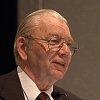 |
|
 |
DOE Ethanol Workshop Series
Nevada Ethanol Workshop
Developing a Pathway to Rural Economic Development Through Ethanol January 9, 2003
9:00 am to 4:00 pm Atlantis Hotel
3800 Virginia St.
Reno, Nevada Nevada Ethanol Workshop Summary
The Nevada Ethanol Workshop took place January 9th at the Atlantis Hotel in Reno. There were 75 people in attendance, which was said to be significantly more than anticipated. Participants came from both northern and southern regions in Nevada, which showed a cooperative effort in the state for ethanol industry development and interests. There were also some participants from California and the Midwest states. Attendees represented government and private industries equally.
Biofuels development was strongly supported by the Governor’s office. Carl Linvill, Energy & Economic Advisor, Office of the Governor, said that over $2 billion (of the $4 billion in total energy expenditures) are spent out-of-state on transportation fuels in Nevada annually. He addressed the impacts energy security and dependency on imported energy, rolling blackouts, and fuel supply disruptions. The state’s goal is to export energy in the next 10 years.
Pat Perez, Office Manager, Office of Transportation Fuel Supply & Demand, California Energy Commission, addressed the concern that MTBE contamination is rising. There’s a huge market opportunity for ethanol in California as a result. Approximately 70-80 percent of the MTBE market in California has already converted to ethanol.
Jeff James, Bioenergy Program Manager, Seattle Regional Office, U.S. DOE, discussed US oil dependence (55% from foreign sources) and the value of biomass feedstocks for ethanol production. DOE is supporting an ethanol program and making biomass energy R&D; a national priority. Biomass R&D; Act of 2000 directs DOE and USDA to enhance and coordinate biomass R&D; efforts while Energy Title IX of the Farm Bill supports increased use of biomass energy and production through R&D.; DOE looks to continue development of biofuels and form partnerships for progress.
It was suggested that the state conduct a feasibility study (or assessment) of the ethanol production potential from various feedstocks and the possible locations for building a plant. The environmental benefits and issues also need to be further reviewed. There are several other action items that can be explained in the more comprehensive article in the next Ethanol Producer Magazine.
Neil Koehler, representing the Renewable Fuels Association, gave an historical perspective about how oil price spikes and supply instabilities became major drivers for renewable energy and followed further support for the industry through the Clean Air Act Amendments of 1990. Now interest in ethanol derives from rural areas. It is thought that climate change issues will be the next driver for ethanol and renewable fuels. Right now, half of the US market for ethanol is for octane enhancement and as a fuel extender.
The final session Developing an Ethanol Industry in Nevada… Where Do We Go from Here? was an interactive discussion about laying out a pathway of steps for industry development in Nevada. Four major areas were identified for further discussion and action.
Issues Surrounding Market Development:
- What is the risk to the state from MTBE dumping?
- Storage implications: is there enough storage space for separate tanks of ethanol and gasoline?
- Competition with other alternative fuels such as propane and compressed natural gas.
- How to further utilize flexible fuel market in fleet vehicles (11,000 vehicles in Nevada)
Support for Ethanol Production:
- Commission feasibility study for siting an ethanol plant
- Need to develop partnerships with oil companies, economic development agencies, and others to find the best location for an ethanol plant
- Legislation for ethanol funding for production
- Research and assess the most sustainable feedstocks for ethanol production in state
- Evaluating the importing of corn for ethanol production
- Review of the USDA loan guarantee funds available for ethanol production
Air Quality:
- State’s ability to maintain air/environmental quality and meeting federal requirements
- Conduct study on life cycle analysis of ethanol production and use in the state
Developing Partnerships:
- Promote and seek out cooperation with industry associations and commodity groups such as the National Corn Growers Association and and others who can provide resources for industry development
- Form coalition with Workshop participants to continue communication on steps towards industry development
Thank you to our Sponsors
Fagen, Incorporated and The Renewable Fuels Association for their support
and thank you for your participation!
BBI International
U.S. DOE Ethanol Workshop Series Coordinators
Ph: 719-539-0300
conferences@bbibiofuels.com
Some attendees asked for a list of Fleet E85 users in Nevada - you can download the list in Microsoft Excel format: NV-fleet-e85-users.xls. The information was provided by the National Ethanol Vehicle Coalition, through Western Energetix. For further information, contact:
Michelle Saab
Director of Communications
National Ethanol Vehicle Coalition
3118 Emerald Lane, Suite 100
Jefferson City, MO 65109
(573) 635-8445
(573) 635-5466 fax
e-mail: msaab@E85fuel.com
Norma McCusker
Berry-Hinckley Industries
Western Energetix Cardlock, a div of Berry-Hinckley Ind.
655 S. Stanford Way
Sparks, NV 89431
(775) 689-1234
(775) 689-1299 fax
(800) 322-4561
norma.mccusker@westernenergetix.com
Fuel ethanol production in America has reached historic levels. In some states, fuel ethanol production supports rural economies. In others, fuel ethanol reduces air pollution. All across the U.S. ethanol reduces dependence on imported oil and provides consumers with energy diversification and added fuel choice. Could Nevada tap its own resources to produce some of its own transportation fuel? What would be involved? What would be the costs and benefits? The workshop will address these questions and others.
Topics:
- A National and Nevada-Specific Overview on Ethanol
- An Overview of Ethanol in California
- How Ethanol Impacts Energy Security, Environmental Improvements, and the Economy
- How Ethanol is Made
- Developing a Market in Nevada for Ethanol
- An Interactive Group Discussion to Create a Path Forward
Who Should Attend:
The workshop will provide information of interest to fuel producers, distributors, retailers, and consumers; regulators; decision-makers; financiers; automotive service technicians; vehicle enthusiasts; environmentalists; media; and the general public.
Sponsored by:
- U.S. Department of Energy
- Nevada State Energy Office
- Nevada Association of Counties
- University of Nevada-Environmental Health & Safety
- Department Bureau of Air Quality Planning
- Washoe District Health-Air Quality Management
- Clark County Department of Air Quality Management
- Ford Motor Company
- U.S. Department of Agriculture
- Truckee Meadows Clean Cities Coalition
- Nevada State Motor Pool
- Las Vegas Regional Clean Cities Coalition
- University of Nevada-Environmental Health & Safety
- Nevada Department of Agriculture
- Nevada Department of Environmental Protection
- Nevada Commission on Economic Development
- Nevada State Parks
For program information on the US DOE Ethanol Workshop Series Workshops, please contact Anne Wester:
Anne Wester
Conference Planning Assistant
BBI International
PO Box 1146
Salida, Colorado 81201
Phone: 719-539-0300
Fax: 719-539-0301
awester@bbibiofuels.com
| Agenda | | | |
8:00 AM |
|
Registration and Continental Breakfast
|
|
| |
9:00 AM |
|
Welcome and Purpose of the Workshop
Carl Linvill, Energy & Economic Advisor, Office of the Governor
|
|
| |
9:15 AM |
|
The United States Bioenergy Initiative – A Good Plan for the Country
 Jeff James, Bioenergy Program Manager, Seattle Regional Office, U.S. Department of Energy Jeff James, Bioenergy Program Manager, Seattle Regional Office, U.S. Department of Energy
|
|
| |
9:30 AM |
|
National Overview on Ethanol – Why this Industry is Growing
 Neil Koehler, Renewable Fuels Association Neil Koehler, Renewable Fuels Association
|
|
| |
10:00 AM |
|
Ethanol in California – What our Neighbors to the West are Experiencing
 Pat Perez, Office Manager, Office of Transportation Fuel Supply & Demand, California Energy Commission Pat Perez, Office Manager, Office of Transportation Fuel Supply & Demand, California Energy Commission
|
|
| |
10:20 AM |
|
Ethanol in Nevada – Historic, Current and Future
 CO and Ethanol as an Oxygenate- CO and Ethanol as an Oxygenate-
Andy Goodrich, Director, Washoe District Health-Air Quality Management Division
 E85 and Nevada's Alternative Fuels in Fleets Program- E85 and Nevada's Alternative Fuels in Fleets Program-
Sigurd Jaunarajs, Environmental Scientist, Nevada Division of Environmental Protection
|
|
| |
10:40 AM |
|
Break
|
|
| |
11:00 AM |
|
PANEL: The Three E’s of Ethanol
 Moderator: Carl Dahlen, Nevada Commission on Economic Development Moderator: Carl Dahlen, Nevada Commission on Economic Development
Energy Security for the State and the Country- Carl Linvill, Energy & Economic Advisor, Office of the Governor
 Environmental Improvements- David Andress, President, David Andress & Associates Environmental Improvements- David Andress, President, David Andress & Associates
 Economic Impact for the Rural Economy- Economic Impact for the Rural Economy-
Dave Kolsrud, Agri-Energy LLC
|
|
| |
12:00 PM |
|
Networking Lunch and Vehicle Display

Two vehicles on display from Jones West Ford |
|
| |
1:15 PM |
|
Update on the Proposed Winnemucca Ethanol Project
 Lee Bosch – Bosch Motors Lee Bosch – Bosch Motors
|
|
| |
1:30 PM |
|
PANEL: How is Ethanol Made?
 Moderator: Peter Konesky, Nevada State Energy Office Moderator: Peter Konesky, Nevada State Energy Office
Grain-to-Ethanol, the ABC’s of Making Ethanol – Steve Core, Fagen, Inc.
 Considerations and Steps to Take when Building an Ethanol Plant– Considerations and Steps to Take when Building an Ethanol Plant–
Mark Yancey, BBI International
|
|
| |
2:30 PM |
|
Break
|
|
| |
2:45 PM |
|
PANEL: How is Ethanol Used?
 Moderator: Jason Geddes, University of Nevada, Health & Safety Department Moderator: Jason Geddes, University of Nevada, Health & Safety Department
E10, E85 and Fuel Cells – Doug Vind, Regent International
 E-Diesel – James Peeples, Vice President, AAE Technologies, Inc. E-Diesel – James Peeples, Vice President, AAE Technologies, Inc.
|
|
| |
3:30 PM |
|
Developing an Ethanol Industry in Nevada: Where Do We Go from Here?
Discussion Leader: Carl Dahlen, Nevada Commission on Economic Development
- An interactive discussion laying out the steps to take and what has to happen to develop an industry in Nevada
|
|
| |
4:30 PM |
|
Adjourn
|
|
|
 |
|
Renewable Diesel Workshops:
NREL
Goals: ..."to educate key public officials and the general public
about biodiesel as a transportation fuel" and ..."to build state and
local coalitions that would form the nuclei of a support group that
would promote and eventually lead to local biodiesel production and
use."
Ethanol Producers'
Technical Workshops:
Perspectives from ethanol producers, production technology
providers, and government researchers. Those in attendance were
given the task of exploring the challenges and opportunities
presented by combining cellulosic ethanol streams with existing
grain streams.
US DOE Ethanol Workshop Series:
A series of one-day, state-level workshops to educate key public
officials and the general public about ethanol as a transportation
fuel.
For best results when printing pages
from this website, try setting your browser or printer driver to print
in landscape orientation instead of portrait to avoid
cutting off text.


|
|
 |